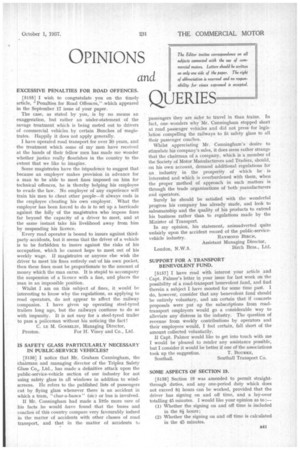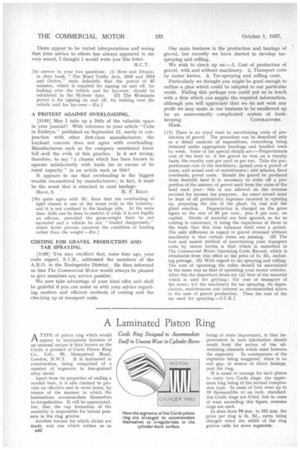OPINIONS
Page 51

Page 52

If you've noticed an error in this article please click here to report it so we can fix it.
and
UERIES
EXCESSIVE PENALTIES FOR ROAD OFFENCES.
[5155] I wish to congratulate you on the timely article, "Penalties for Road Offences," .which appeared in the September 17 issue of your paper. The case, as stated by you, is by no means an exaggeration, but rather an under-statement of the savage treatment which is being meted out to drivers of commercial vehicles by certain Benches of magistrates. Happily it does not apply generally.
I have operated road transport for over 30 years, and the treatment which some of my men have received at the hands of their fellow men has made me wonder whether justice really flourishes in the country to the extent that we like to imagine.
Some magistrates have the impudence to suggest that because an employer makes provision in advance for a man to be able to meet fines imposed on him for technical offences, he is thereby helping his employee to evade the law. No employer of any experience will train his men to cheat other people—it always ends in the employee cheating his own employer. What the employer has been forced to do is to set up a barricade against the folly of the magistrates who impose fines far beyond the capacity of a driver to meet, and at the same instant take his livelihood away from him by suspending his licence.
Every road operator is bound to insure against thirdparty accidents, but it seems that the driver of a vehicle is to be forbidden to insure against the risks of his occupation, which he cannot hope to meet out of his weekly wage. If magistrates or anyone else wish the driver to meet his fines entirely out of his own pocket, then these fines must be proportionate to the amount of money which the man earns. It is stupid to accompany the suspension of a licence with a fine, and places the man in an impossible position.
Whilst I am on this subject of fines, it would be interesting to know why the regulations, as applying to road operators, do not appear to affect the railway companies. I have given up operating steel-tyred trailers long ago, but the railways continue to do so with impunity. It is not easy for a steel-tyred trailer to pass a policeman without his noticing the fact !
C. LE M. GossEux, Managing Director,
Preston. For H. Viney and Co., Ltd.
IS SAFETY GLASS PARTICULARLY NECESSARY IN PUBLIC-SERVICE VEHICLES?
[5156] I notice that Mr. Graham Cunningham, the chairman and managing director of the Triplex Safety Glass Co, Ltd., has made a definitive attack upon the public-service-vehicle section of our industry for not using safety glass in all windows in addition to windscreens. He refers to the published lists of passengers cut by flying glass whenever there is an accident in which a tram, " char-a-bancs " (sic) or bus is involved.
If Mr. Cunningham had made a little more sure of his facts he would .have found that the buses and coaches of this country compare very favourably indeed in the matter of accidents with other classes of road transport, and that in the matter of accidents to passengers they are safer to travel in than trains. In fact, one wonders why Mr. Cunningham stopped short at road passenger vehicles and did not press for legislation compelling the railways to fit safety glass to all their passenger coaches.
Whilst appreciating Mr. Cunningham's desire to stimulate his company's sales, it does seem rather strange that the chairman of a company, which is a member of the Society of Motor Manufacturers and Traders, should, on his own account, demand additional regulations for an industry in the prosperity of which he is interested and which is Overburdened with them, when the proper method of approach in such matters is through the trade organizations of both manufacturers and operators. Surely he should be satisfied with the wonderful progress his company has already made, and look to salesmanship and the quality of his products to extend his business rather than to regulations made by the Minister of Transport. In my opinion, his statement, animadverted quite unfairly upon the accident record of the public-service vehicle industry. RAYMOND BIRCH, Assistant Managing Director, London, N.W.5. Birch Bros., Ltd.
SUPPORT FOR A TRANSPORT BENEVOLENT FUND.
[5157] I have read with interest your article and Capt. Palmer's letter in your issue for last week on the possibility of a road-transport benevolent fund, and find therein a subject I have mooted for some time past. I do, however, consider that any benevolent fund should be entirely voluntary, and am certain that if concrete proposals were put up the subscriptions from roadtransport employers would go a considerable way to alleviate any distress in the industry. The question of revenue from weekly contributions by operators and their employees would, I feel certain, fall short of the amount collected voluntarily.
If Capt. Palmer would like to get into touch with me I would be pleased to render any assistance possible, but I consider it would be better if one of the associations took up the suggestion. T. BOURKE, Southall. Southall Transport Co.
SOME ASPECTS OF SECTION 19.
[5158] Section 19 was amended to permit straightthrough duties, and any one-period duty which does not exceed 81 hours can be worked, provided that the driver has signing on and off time, and a lay-over totalling 45 minutes. I would like your opinion as to :— (1) Whether the signing on and off time is included in the 8it hours ; (2) Whether the signing on and off time is calculated in the 45 minutes.
There appear to be varied interpretations and seeing that your advice to others has always appeared to me very sound, I thought I would write you this letter.
[In answer to your two questions: (1) Rees and Dennis, in their book, "The Road Traffic Acts, 1930 and 1934 and Orders," state definitely that the period of 45 minutes, which is required for signing on and off, for looking over the vehicle and for lay-over, should be calculated in the Si-hour duty. (2) The 45-minute period is for signing on and off, for looking over the vehicle and for lay-over.—Eol
A PROTEST AGAINST OVERLOADING.
[5159] May I take up a little of the valuable space in your journal? With reference to your article "Cubs in Embryo," published on September 17, surely in conjunction with other first-class manufacturers, the Leyland concern does not agree with overloading. Manufacturers such as the company mentioned know full .well the evils of this practice. Is it not wrong, therefore, to say "a chassis which has been known to operate satisfactorily with loads far in excess of its rated capacity' in an article such as this?
It appears to me that overloading is the biggest trouble encountered by manufacturers ; in fact, it must be the worst that is attached to road haulage.
Hove, 3. H. F. KEAT.
[We quite agree with Mr. Keat that the overloading of light chassis is one of the worst evils M the industry, and it is not confined to the haulage side. At the same time, little can be done to restrict it while it is not legally an offence, provided the gross-weight limit be not exceeded and a vehicle be not "loaded dangerously," which latter proviso concerns the condition of loading rather than the weight—En.]
COSTING FOR GRAVEL PRODUCTION AND TAR SPRAYING.
[5160] You may recollect that, some time ago, your 'costs expert, S.T.E., addressed the members of the A.R.O. in the Basingstoke District. He then informed us that The Commercial Motor would always be pleased to give members any advice possible.
We now take advantage of your kind offer and shall be grateful if you can assist us with your advice regarding modern and efficient methods of costing and the checking up of transport costs. Our main business is the production and haulage of gravel, but recently we have started to develop tarspraying and rolling.
We wish to check up on:-1, Cost of production of gravel, with and without machinery. 2, Transport costs by motor lorries_ 3, Tar-spraying and rolling costs.
Particularly we thought you might be good enough to outline a plan which could be adapted to our particular needs. Failing this perhaps you could put us in touch with a firm which can supply the required information, although you will appreciate that we do not wish any profit we may make in our business to be swallowed up by an unnecessarily complicated system of book
keeping. CONTRACTORS. Hook.
[ (1) There is no royal road to ascertaining costs of production of gravel. The procedure can be described only as a detail analysis of expenditure, everything being itemized under appropriate headings and totalled week by week. Some of the special details are :—Proportionate cost of the land or, if the gravel be won on a royalty basis, the royalty cost per yard or per ton. Take the proportionate cost of the machinery, spread over a period of years, and actual cost of maintenance ; add salaries, fixed overheads, power costs. Should the gravel be produced from freehold land it is necessary to write of a proportion of the amount of gravel used from the value of the land each year ; this is not allowed on the revenue account for income tax purposes. An exact record must be kept of all preliminary expenses incurred in opening up, preparing the site of the plant, its cost and the plant erection. Depreciation is charged on the gross figure at the rate of 20 per cent., plus 5 per cent, on capital. Stocks of material are best ignored, so far as costing is concerned, it being the experience of those in the trade that this item balances itself over a period. The only difference in regard to gravel obtained without machinery is that certain items are missing. (2) The best and easiest method of ascertaining your transport costs by motor lorries is that which is embodied in The Commercial Motor Operating Costs Record, which is obtainable from this office at the price of is. 3d., including postage. (3) With regard to tar spraying and roiling. The cost of operating the roller should be ascertained in the same way as that of operating your motor vehicles. After this the important items are (a) that of the material which is used for gritting ; (b) cost of transport of the same; (c) the machinery for tar spraying, its depreciation, maintenance and interest as recommended above in the case of gravel production. Then the cost of the tar used for spraying.—S.T.R.1




















































































